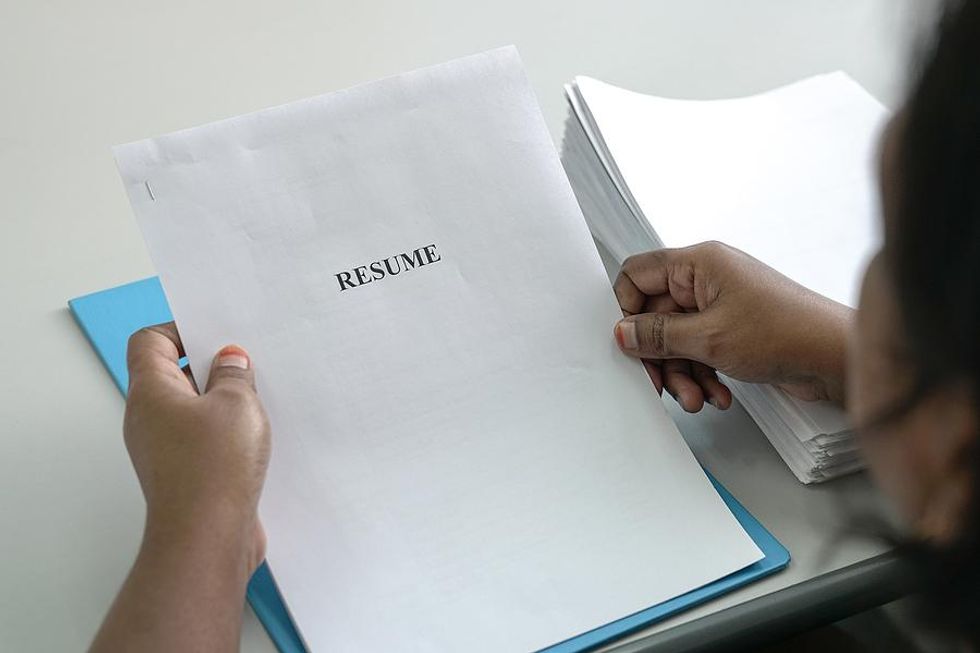
7 Ways Your Resume Is Boring Just Like Everyone Else’s
 {"adCodes": [{"desktop": "\u003cdiv class=\u0027rblad-wit_content\u0027\u003e\u003c/div\u003e", "display": true, "mobile": "\u003cdiv class=\u0027rblad-wit_content\u0027\u003e\u003c/div\u003e", "new_amp": "\u003camp-ad width=336 height=280\n type=\"doubleclick\"\n data-slot=\"/22278042776,22664312254/wit/wit_content\"\n data-multi-size=\"300x250\"\u003e\n\u003c/amp-ad\u003e", "order": 0, "tablet": "\u003cdiv class=\u0027rblad-wit_content\u0027\u003e\u003c/div\u003e"}, {"desktop": "\u003cdiv class=\u0027rblad-wit_content\u0027\u003e\u003c/div\u003e", "display": true, "mobile": "\u003cdiv class=\u0027rblad-wit_content\u0027\u003e\u003c/div\u003e", "new_amp": "\u003camp-ad width=336 height=280\n type=\"doubleclick\"\n data-slot=\"/22278042776,22664312254/wit/wit_content\"\n data-multi-size=\"300x250\"\u003e\n\u003c/amp-ad\u003e", "order": 1, "tablet": "\u003cdiv class=\u0027rblad-wit_content\u0027\u003e\u003c/div\u003e"}, {"desktop": "\u003cdiv class=\u0027rblad-wit_content\u0027\u003e\u003c/div\u003e", "display": true, "mobile": "\u003cdiv class=\u0027rblad-wit_content\u0027\u003e\u003c/div\u003e", "new_amp": "\u003camp-ad width=336 height=280\n type=\"doubleclick\"\n data-slot=\"/22278042776,22664312254/wit/wit_content\"\n data-multi-size=\"300x250\"\u003e\n\u003c/amp-ad\u003e", "order": 2, "tablet": "\u003cdiv class=\u0027rblad-wit_content\u0027\u003e\u003c/div\u003e"}], "adsOrder": [2]}
{"adCodes": [{"desktop": "\u003cdiv class=\u0027rblad-wit_content\u0027\u003e\u003c/div\u003e", "display": true, "mobile": "\u003cdiv class=\u0027rblad-wit_content\u0027\u003e\u003c/div\u003e", "new_amp": "\u003camp-ad width=336 height=280\n type=\"doubleclick\"\n data-slot=\"/22278042776,22664312254/wit/wit_content\"\n data-multi-size=\"300x250\"\u003e\n\u003c/amp-ad\u003e", "order": 0, "tablet": "\u003cdiv class=\u0027rblad-wit_content\u0027\u003e\u003c/div\u003e"}, {"desktop": "\u003cdiv class=\u0027rblad-wit_content\u0027\u003e\u003c/div\u003e", "display": true, "mobile": "\u003cdiv class=\u0027rblad-wit_content\u0027\u003e\u003c/div\u003e", "new_amp": "\u003camp-ad width=336 height=280\n type=\"doubleclick\"\n data-slot=\"/22278042776,22664312254/wit/wit_content\"\n data-multi-size=\"300x250\"\u003e\n\u003c/amp-ad\u003e", "order": 1, "tablet": "\u003cdiv class=\u0027rblad-wit_content\u0027\u003e\u003c/div\u003e"}, {"desktop": "\u003cdiv class=\u0027rblad-wit_content\u0027\u003e\u003c/div\u003e", "display": true, "mobile": "\u003cdiv class=\u0027rblad-wit_content\u0027\u003e\u003c/div\u003e", "new_amp": "\u003camp-ad width=336 height=280\n type=\"doubleclick\"\n data-slot=\"/22278042776,22664312254/wit/wit_content\"\n data-multi-size=\"300x250\"\u003e\n\u003c/amp-ad\u003e", "order": 2, "tablet": "\u003cdiv class=\u0027rblad-wit_content\u0027\u003e\u003c/div\u003e"}], "adsOrder": [2]}
More and more job seekers are coming to us and letting us know about internal opportunities within their organization that they would like to apply to. But even as more opportunities open up, the competition is as strong—or stronger—than ever before. That's why your resume has to be perfect.
Your resume needs to stand out to the hiring manager. If you're not getting job interviews, your resume probably isn't as good as you think it is. In fact, it's probably boring employers. So, take it out, brush it off, and let's kick it up a notch.
Here are seven reasons why your resume is boring, and how to fix it...
1. It's Still Sporting That Outdated Objective
If your resume is utilizing an objective, you really should trash it and start all over with a fresh, powerful top fold that includes your personal branding statement and a list of the skills you possess that are relevant to the position you're applying for. A polished personal branding statement will catch the employer's attention and give him or her the best information up front—the information he or she needs to make a decision to call you to schedule an interview.
2. The Design/Format Is Also Outdated
Bigstock
There is a strategy behind resume formatting and design. A simple resume format is best because it makes it easier for employers to read the information you've provided. But if you haven't updated your resume formatting in years, it probably contains a lot of text and not enough white space, therefore making it hard for hiring managers to get the information they need in the few seconds they're reviewing your resume. You'll look out of touch and they'll be bored quickly. So, make sure you updated your resume formatting!
3. It's Missing Important Keywords Bigstock
Bigstock Omit keywords and the ATS (software system scanning your resume) can't find you. The recruiter giving your resume a quick once-over is looking for specific keywords as well. Leave them out and you'll be left out of the interview process.
4. It Has Generic And/Or Vague Statements
Avoid using the same old terminology that everyone else uses in their resumes. Yes, we know you can problem solve. But instead of telling me you're a problem solver, show me the result of a problem you solved. An effective resume contains quantifiable accomplishments, not just duties or responsibilities.
5. It Doesn't Focus On Hard Skills Bigstock
Bigstock And the championship goes to…hard skills. I used to be a full-time recruiter, and I used Monster and CareerBuilder to search for candidates. Not once did I enter the search terms: great communicator, excellent verbal skills, detail-oriented. These are universal statements millions use to describe themselves. Give me something tangible and relevant to the position I am trying to fill. You'll demonstrate these hard skills when you quantify your work experience.
6. It Tells vs. Shows Bigstock
Bigstock Instead of wasting valuable real estate on your resume providing me with a rundown of the job description (the same one I've read a million times as a hiring manager), show me what you achieved, what you accomplished, and what you contributed in the past.
Wow me with something other than the predictable, mundane job description. I want to know the challenges you faced in your previous roles, how you addressed them, and the results you obtained. This makes you different from everyone else. No two people will have the exact same experiences. Your experiences are what make you outshine your competition—use them to your advantage!
7. It's Passive
Bigstock
Using passive terminology is boring and lacks action. Instead of using phrases like "served as," "duties included," "promoted to," and "worked with," choose strong action verbs. Action verbs do just what they say: they convey action and, ultimately, results.
The hiring manager is interested in the results you can provide about what you did along the way. Choose terms like: launched, catapulted, spearheaded, and pioneered. These words tell me something. They show me the action you took and captivate my attention so that I want to read on to discover the results you achieved.
Your resume needs to do two things: it needs to capture the hiring manager's attention, and it needs to motivate him or her to pick up the phone and call you for an interview. If you look and sound like everyone else, you have no competitive advantage. Therefore, you've provided the HR person with zero motivation to pick up the phone, call you, and schedule an interview.
Stop creating a 'same old, same old' resume that looks and feels just like everyone else's. Start by adding some variety and focusing on your accomplishments today.
We know how difficult it can be to write a resume when there's so much conflicting information out there. If you're struggling to write an effective resume and land job interviews, we can help.
We'd love it if you joined our FREE community. It’s a private, online platform where workers, just like you, are coming together to learn and grow into powerful Workplace Renegades. More importantly, we have tons of resources inside our community that can help you write your resume—the right way.
It's time to find work that makes you feel happy, satisfied, and fulfilled. Join our FREE community today to finally become an empowered business-of-one!
This article was originally published at an earlier date.
From Your Site Articles- How To Optimize The Most Important Part Of Your Resume - Work It ... ›
- 4 Tips For Writing A Powerful And Effective Resume - Work It Daily ›
- 7 Ways To Tailor Your Resume For A Leadership Position - Work It ... ›
- Is Your Executive Resume Too Wordy? - Work It Daily ›
- 6 Common Resume Mistakes To Avoid - Work It Daily ›
- 10 Things To Remove From Your Resume - Work It Daily ›
- How to Make Your Resume Less Boring | FlexJobs ›
- Your Resume Is Boring and That's Why You Can't Get Interviews | by ... ›
- Why Your Resume is Boring and What you Can Do About it | Charter ... ›
 {"adCodes": [{"desktop": "\u003cdiv class=\u0027rblad-wit_content\u0027\u003e\u003c/div\u003e", "display": true, "mobile": "\u003cdiv class=\u0027rblad-wit_content\u0027\u003e\u003c/div\u003e", "new_amp": "\u003camp-ad width=336 height=280\n type=\"doubleclick\"\n data-slot=\"/22278042776,22664312254/wit/wit_content\"\n data-multi-size=\"300x250\"\u003e\n\u003c/amp-ad\u003e", "order": 0, "tablet": "\u003cdiv class=\u0027rblad-wit_content\u0027\u003e\u003c/div\u003e"}, {"desktop": "\u003cdiv class=\u0027rblad-wit_content\u0027\u003e\u003c/div\u003e", "display": true, "mobile": "\u003cdiv class=\u0027rblad-wit_content\u0027\u003e\u003c/div\u003e", "new_amp": "\u003camp-ad width=336 height=280\n type=\"doubleclick\"\n data-slot=\"/22278042776,22664312254/wit/wit_content\"\n data-multi-size=\"300x250\"\u003e\n\u003c/amp-ad\u003e", "order": 1, "tablet": "\u003cdiv class=\u0027rblad-wit_content\u0027\u003e\u003c/div\u003e"}, {"desktop": "\u003cdiv class=\u0027rblad-wit_content\u0027\u003e\u003c/div\u003e", "display": true, "mobile": "\u003cdiv class=\u0027rblad-wit_content\u0027\u003e\u003c/div\u003e", "new_amp": "\u003camp-ad width=336 height=280\n type=\"doubleclick\"\n data-slot=\"/22278042776,22664312254/wit/wit_content\"\n data-multi-size=\"300x250\"\u003e\n\u003c/amp-ad\u003e", "order": 2, "tablet": "\u003cdiv class=\u0027rblad-wit_content\u0027\u003e\u003c/div\u003e"}], "adsOrder": [2]}
{"adCodes": [{"desktop": "\u003cdiv class=\u0027rblad-wit_content\u0027\u003e\u003c/div\u003e", "display": true, "mobile": "\u003cdiv class=\u0027rblad-wit_content\u0027\u003e\u003c/div\u003e", "new_amp": "\u003camp-ad width=336 height=280\n type=\"doubleclick\"\n data-slot=\"/22278042776,22664312254/wit/wit_content\"\n data-multi-size=\"300x250\"\u003e\n\u003c/amp-ad\u003e", "order": 0, "tablet": "\u003cdiv class=\u0027rblad-wit_content\u0027\u003e\u003c/div\u003e"}, {"desktop": "\u003cdiv class=\u0027rblad-wit_content\u0027\u003e\u003c/div\u003e", "display": true, "mobile": "\u003cdiv class=\u0027rblad-wit_content\u0027\u003e\u003c/div\u003e", "new_amp": "\u003camp-ad width=336 height=280\n type=\"doubleclick\"\n data-slot=\"/22278042776,22664312254/wit/wit_content\"\n data-multi-size=\"300x250\"\u003e\n\u003c/amp-ad\u003e", "order": 1, "tablet": "\u003cdiv class=\u0027rblad-wit_content\u0027\u003e\u003c/div\u003e"}, {"desktop": "\u003cdiv class=\u0027rblad-wit_content\u0027\u003e\u003c/div\u003e", "display": true, "mobile": "\u003cdiv class=\u0027rblad-wit_content\u0027\u003e\u003c/div\u003e", "new_amp": "\u003camp-ad width=336 height=280\n type=\"doubleclick\"\n data-slot=\"/22278042776,22664312254/wit/wit_content\"\n data-multi-size=\"300x250\"\u003e\n\u003c/amp-ad\u003e", "order": 2, "tablet": "\u003cdiv class=\u0027rblad-wit_content\u0027\u003e\u003c/div\u003e"}], "adsOrder": [2]}
Public speaking can’t always be avoided in the business world when you’re tapped on the shoulder to give a presentation to your peers or to an important client.
Even in the age of home video conferencing, it’s still very natural to feel like you’d rather do ANYTHING other than turn on that camera, take a deep breath, and feel everyone’s eyes on you…watching.
Ever wonder how actors push through stage fright?
As a trained actor and coach (prior to entering the business world), I’ve learned to not be timid while orating Shakespeare in the spotlight or when hitting those high notes in front of thousands of eyeballs.
Not surprisingly, the same tricks actors use can be applied to public speaking in a business context. Here are some tips from an actor-turned-business-professional on calming your nerves.
Tip #1: Put Yourself In The Audience’s Seats
Bigstock
I always get incredibly nervous right before a singing audition. I’ve found what helps lessen my anxiety is to do as a fellow performer once suggested and put myself in the director’s chair. (The director is typically the person who decides if you are cast in the show).
The director WANTS you to do well! They want you to be the perfect person for the role—able to garner good reviews and box office sales. They want you to do so well that they could even tell everyone else to go home; they’ve found their star.
Plus, no director wants to sit through hours and hours of bad singing auditions…would you?
Likewise with public speaking.
When have you ever found yourself listening to a speaker and wished that they would be boring? Or wanted them to bomb so badly that you get nothing from their talk?
Rather, you probably hope the speaker is so dynamite that you actually forget to take notes because you are so transfixed and inspired by their message.
Know that the audience is on your side and let that encourage you. They want you to do well.
Tip #2: Give ‘Em The Old Razzle-Dazzle
Bigstock
I love to tap dance. Sometimes (ok, quite often), my feet don’t move as quickly as they should and I mess up a step or two…or ten.
A choreographer once taught me that a major part of dancing, and where the audience usually focuses, is all in the face and arms. If you are smiling a 1,000-watt smile and making grand arm gestures, the audience isn’t likely to see that your feet messed up that paradiddle step. (Yes, that’s a real thing!)
Public speaking also follows this rule. The audience can’t tell that you are nervous and feel like you just might pass out.
Bluff it! Put on your smile and stand tall. Walk with purpose and speak with authority, even if you feel unsure of yourself. It can feel weird, but you have to trust me here.
When you act as if you are confident, the audience will assume you are confident. Your body will even convince your brain into believing that you are, in fact, confident!
What if you DO mess up? So what? Keep going! Don’t drop your poise and strong voice, as they are effectively drawing attention away from any insecurities that may come up, just like jazz hands can help cover for missing a step-shuffle-ball-change.
Tip #3: Enter The Clown
Bigstock
Actors have learned that mistakes are bound to happen and sometimes you have to play the fool.
For instance, props or scenery may break or fall unexpectedly during a show. Actors are taught to pretend like it is supposed to happen, and work it into the scene. Or they may quickly remove the wayward item and simply continue on.
I’ve even witnessed actors stumble and fall onstage, then make a comment about what a klutz they are (in character, of course!) and continue on like it was scripted that way.
Let’s say during your speech you trip up on some words unexpectedly. Work it into the presentation as if you meant for it to happen. For example: “The biggest finanbial chamanges…a-hem, well those lesser-known things…as well as the biggest financial challenges we face are…”
Call yourself out and you get an on-the-spot joke to lighten the mood—and the audience loves you for it.
Or let’s say you knock over your glass of water while speaking. That’s the perfect time to make a crack about how uncoordinated you are and why you never made the basketball team. (*Rimshot please!*)
Tip #4: “Once Again From The Top, Ah-5-6-7-8!”
Bigstock
Actors spend hours, days…weeks! memorizing their lines to be “word perfect” right down to the smallest pause. They get every tilt of the head, every gesture, and every single word into muscle memory.
When opening night comes, no matter how much their stomach is turning over like they’re on a cruise ship in a hurricane, they can effectively put themselves on autopilot and get through the show without a hitch.
Now, with this tip, I would NEVER recommend that you, as a public speaker, go to the extremes actors do.
Why? Memorizing isn’t necessary for public speaking. In fact, I strongly suggest you don’t memorize, as you risk coming off as “fake.”
Rehearsing on the other hand is a must!
Rehearse in front of a mirror…while shopping for groceries…in front of a friend. Video or audio record yourself and play it back.
If possible, practice in the actual space where you will be speaking (yes, even if it’s in your home office) to get a feel for it so that it doesn’t disorient you on the big day.
Your goal is to know your main points and examples while allowing yourself to improvise here and there with different words and phrases to keep it fresh.
If you try to memorize and you forget a sentence while speaking, it has the tendency to really trip you up unless you’re a seasoned pro. However, if you practice experimenting with different ways of saying things, you’re building your quick-thinking prowess and ability to handle the unexpected while in the spotlight.
Notes are, of course, perfectly acceptable, but you don’t want to stay buried in your notes resulting in never making eye contact with the audience (or webcam).
Another no-no is clearly reading from a script while on a video conference. Reading a script is one of the best ways to disengage the audience unless you are very good at making it sound conversational…a tough skill to master.
Instead, know your speech so well that glancing at the first few words on a notecard will propel you into that part of the speech, without having to constantly refer to your notes.
Epilogue
Remember that public speaking is one fear that, with a little practice and the right mindset, can be overcome. Who knows, you may start to crave the spotlight so much that I’ll see you at the next audition!
Read more Show less public speaking {"customDimensions": {"1":"Executive Community, Andrea Markowski","2":"blog","3":"public speaking, public speaker, acting tricks, public speaking skills, public speaking tips, presentation, presentation tips, presentation skills, presenting, acting, how to become a better public speaker, how to get better at public speaking, confidence, actors, ~rmsc:rebelmouse-image:29815655, ~rmsc:rebelmouse-image:29815640, ~rmsc:rebelmouse-image:29815703, ~rmsc:rebelmouse-image:29815700, ~rmsc:rebelmouse-image:29815702","4":"05/18/2022"}, "post": {"split_testing": {}, "providerId": 0, "sections": [0, 473333499, 544324100, 479660731, 544398583], "buckets": [], "authors": [21030904, 25275496]} } Featured 4 Fascinating Acting Tricks To Become A Better Public Speaker
{"customDimensions": {"1":"Executive Community, Andrea Markowski","2":"blog","3":"public speaking, public speaker, acting tricks, public speaking skills, public speaking tips, presentation, presentation tips, presentation skills, presenting, acting, how to become a better public speaker, how to get better at public speaking, confidence, actors, ~rmsc:rebelmouse-image:29815655, ~rmsc:rebelmouse-image:29815640, ~rmsc:rebelmouse-image:29815703, ~rmsc:rebelmouse-image:29815700, ~rmsc:rebelmouse-image:29815702","4":"05/18/2022"}, "post": {"split_testing": {}, "providerId": 0, "sections": [0, 473333499, 544324100, 479660731, 544398583], "buckets": [], "authors": [21030904, 25275496]} }
4 Fascinating Acting Tricks To Become A Better Public Speaker
{"customDimensions": {"1":"Executive Community, Andrea Markowski","2":"blog","3":"public speaking, public speaker, acting tricks, public speaking skills, public speaking tips, presentation, presentation tips, presentation skills, presenting, acting, how to become a better public speaker, how to get better at public speaking, confidence, actors, ~rmsc:rebelmouse-image:29815655, ~rmsc:rebelmouse-image:29815640, ~rmsc:rebelmouse-image:29815703, ~rmsc:rebelmouse-image:29815700, ~rmsc:rebelmouse-image:29815702","4":"05/18/2022"}, "post": {"split_testing": {}, "providerId": 0, "sections": [0, 473333499, 544324100, 479660731, 544398583], "buckets": [], "authors": [21030904, 25275496]} }
 Now Hiring: Remote SysOps Engineer
{"customDimensions": {"1":"Work It Daily, Kinsta \u00ae","2":"popular","3":"kinsta, hiring, remote jobs, remote work, remote workforce, remote companies hiring, remote companies 2021, sysops engineer, sysops engineer jobs, ~popular_source-pageview","4":"05/18/2021"}, "post": {"split_testing": {}, "providerId": 0, "sections": [370480899, 545998439, 545998440, 376489962, 473333499, 526353713, 545658354, 548352055, 548352058, 543270555, 473310812, 473310813], "buckets": [], "authors": [19548593, 21891195]} }
Now Hiring: Remote SysOps Engineer
{"customDimensions": {"1":"Work It Daily, Kinsta \u00ae","2":"popular","3":"kinsta, hiring, remote jobs, remote work, remote workforce, remote companies hiring, remote companies 2021, sysops engineer, sysops engineer jobs, ~popular_source-pageview","4":"05/18/2021"}, "post": {"split_testing": {}, "providerId": 0, "sections": [370480899, 545998439, 545998440, 376489962, 473333499, 526353713, 545658354, 548352055, 548352058, 543270555, 473310812, 473310813], "buckets": [], "authors": [19548593, 21891195]} }
 3 Important Career Lessons Learned On And Off The Field
{"customDimensions": {"1":"Executive Community, J.T. O'Donnell","2":"popular","3":"career change, entrepreneur, entrepreneurship, career, career challenges, overcoming career challenges, personal branding, personal development, professional development, professional growth, success, career success, pro athletes, tom brady, chris gronkowski, nfl, tiktok, social media strategy, social media, career growth","4":"02/10/2021"}, "post": {"split_testing": {}, "providerId": 0, "sections": [0, 370480899, 479660731, 376489962, 526353713, 376489624, 473333499], "buckets": [], "authors": [21030904, 19549412]} }
3 Important Career Lessons Learned On And Off The Field
{"customDimensions": {"1":"Executive Community, J.T. O'Donnell","2":"popular","3":"career change, entrepreneur, entrepreneurship, career, career challenges, overcoming career challenges, personal branding, personal development, professional development, professional growth, success, career success, pro athletes, tom brady, chris gronkowski, nfl, tiktok, social media strategy, social media, career growth","4":"02/10/2021"}, "post": {"split_testing": {}, "providerId": 0, "sections": [0, 370480899, 479660731, 376489962, 526353713, 376489624, 473333499], "buckets": [], "authors": [21030904, 19549412]} }
 How Ex-NFL Player, Chris Gronkowski, Is Using Social Media To Change Careers
{"customDimensions": {"1":"Executive Community, J.T. O'Donnell","2":"popular","3":"2010, Barstool, camera phone, career growth and development, career growth opportunities, chrisgronkowski, cowboys, dallascowboys, dinner, football, free, gronkspike, iceshaker, investor, nfl, nflfootball, nflplayer, nflplayers, nflworkout, payday, rookie, salary, sharing, sharktank, tic toc, tic tok, tick tock, ticktock, tictok, tik tok, tiktok, tiktok.com, trade, trainingcamp, upload, video, video phone, weighin, youtube.com, ~popular_source-pageview, \u0442\u0438\u043a \u0442\u043e\u043a, \u30c6\u30a3\u30c3\u30af\u30c8\u30c3\u30af, chris gronkowski","4":"01/29/2021"}, "post": {"split_testing": {}, "providerId": 0, "sections": [0, 370480899, 473333499, 526353713, 376489624, 479660731], "buckets": [], "authors": [21030904, 19549412]} }
How Ex-NFL Player, Chris Gronkowski, Is Using Social Media To Change Careers
{"customDimensions": {"1":"Executive Community, J.T. O'Donnell","2":"popular","3":"2010, Barstool, camera phone, career growth and development, career growth opportunities, chrisgronkowski, cowboys, dallascowboys, dinner, football, free, gronkspike, iceshaker, investor, nfl, nflfootball, nflplayer, nflplayers, nflworkout, payday, rookie, salary, sharing, sharktank, tic toc, tic tok, tick tock, ticktock, tictok, tik tok, tiktok, tiktok.com, trade, trainingcamp, upload, video, video phone, weighin, youtube.com, ~popular_source-pageview, \u0442\u0438\u043a \u0442\u043e\u043a, \u30c6\u30a3\u30c3\u30af\u30c8\u30c3\u30af, chris gronkowski","4":"01/29/2021"}, "post": {"split_testing": {}, "providerId": 0, "sections": [0, 370480899, 473333499, 526353713, 376489624, 479660731], "buckets": [], "authors": [21030904, 19549412]} }
AP by OMG
Asian-Promotions.com |
Buy More, Pay Less | Anywhere in Asia
Shop Smarter on AP Today | FREE Product Samples, Latest
Discounts, Deals, Coupon Codes & Promotions | Direct Brand Updates every
second | Every Shopper’s Dream!
Asian-Promotions.com or AP lets you buy more and pay less anywhere in Asia. Shop Smarter on AP Today. Sign-up for FREE Product Samples, Latest Discounts, Deals, Coupon Codes & Promotions. With Direct Brand Updates every second, AP is Every Shopper’s Dream come true! Stretch your dollar now with AP. Start saving today!
Originally posted on: https://www.workitdaily.com/boring-resume